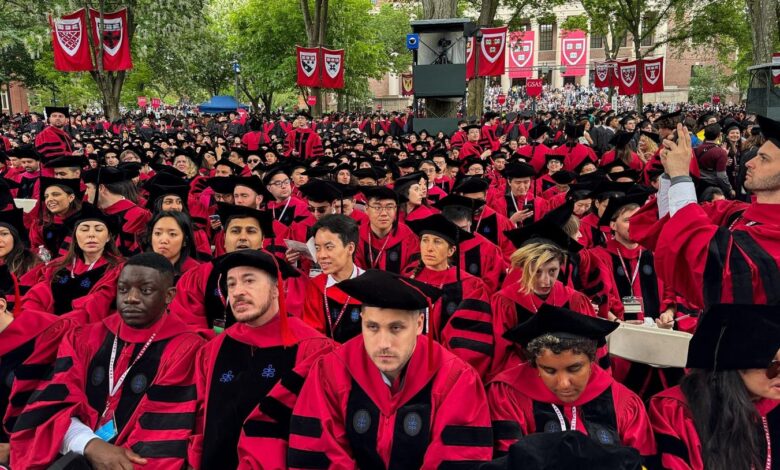How College Graduates Can Break Into Crypto And AI Careers

📝 usncan Note: How College Graduates Can Break Into Crypto And AI Careers
Disclaimer: This content has been prepared based on currently trending topics to increase your awareness.
Graduates gather as they attend commencement ceremony at Harvard University in Cambridge, Massachusetts, on May 29, 2025. Photo by Rick Friedman / AFP) (Photo by RICK FRIEDMAN/AFP via Getty Images)
AFP via Getty Images
Last month, Meta made headlines for dangling up to $1 billion to poach top AI talent from competitors. It’s the kind of move that signals just how desperate tech giants have become for people who can advance artificial intelligence. And it’s not just Meta. Amazon is advertising three times as many AI positions as Google or Microsoft, with senior packages hitting $263,700 before stock options even kick in.
Crypto is just as hyper-competitive. While traditional tech hiring slowed down in 2024, crypto jobs rebounded with a 60% year-over-year increase, and AI postings jumped 59% on LinkedIn. For new graduates looking to break into high-paying, future-proof careers, these two sectors offer some of the best opportunities available right now.
But times have changed and it is no longer enough to just graduate from a target university. 23% of Harvard Business School MBAs are still unemployed 3 months after graduating. Many entry-level tasks that once went to juniors can now be handled by LLMs. I started my own career as a VC Analyst where most of my work would now be a Deep Research prompt. So what’s left for fresh graduates?
The Builder Track Still Rules
Coding agents are incredible, but engineers are not going anywhere. AI and blockchain companies need software talent constantly as they’re building new products, exploring tools, and updating systems around the clock. Machine learning engineers are pulling in $160,000 to $200,000, with a fifth of job postings offering more than $200,000. Blockchain developers start around $150,000 and can hit $250,000 for senior roles, especially if you have vertical specific expertise.
About to graduate as a software engineer? You already have a head start, but you should really be building and shipping apps. Join hackathons, experiment with the latest frameworks and pitch products directly to teams you’d love to work with. Every single hacker you meet today could be your co-founder tomorrow. Build that network early.
Crypto is a very accessible industry due to its open-source nature. You can and should already get active in ecosystems and deploy smart contracts and dApps to show hands-on experience. In AI, build multi-agent systems using A2A, MCP, or similar frameworks – few people have practical experience with MCP servers, so that alone can set you apart. Most importantly, build apps that solve your own problems – this authentic experience often matters more than perfect credentials.
Don’t Sleep on Marketing and PR
While engineers form the core, every project needs a voice. AI and crypto are notoriously bad at explaining themselves to the average person. That’s where marketing and PR professionals come in. These sectors desperately need people who can translate complex technical concepts into language that makes sense to everyone else. Easier achieved in AI where the product does all the convincing and value-add is more obvious, but crucial for crypto where most companies have not yet found product-market fit.
Traditionally, marketing hires didn’t need to be technical. Today, they do. Understanding the core deeply and being able to pitch it yourself is now the expectation. The heart of communication roles is still of course to intimately understand the audience. In crypto, this can mean being degen, cypherpunk or wall street. In AI, you can look at policy, AGI, agents and alignment. You can see why this is such a difficult role to fill and therefore also really well compensated. Head of Marketing in crypto remains the industry’s hardest hire.
Non-Technical Roles Are Growing Fast
Beyond marketing, there’s a whole ecosystem of non-technical jobs that are expanding rapidly. Product managers, while often technical, mainly need to work on roadmaps based on real user feedback and fix UX so that any go-to-market strategy can actually drive adoption. Policy analysts navigate the increasingly complex world of AI regulation and crypto compliance. Ethics specialists make sure AI systems don’t discriminate or cause harm. Legal counsel helps companies stay on the right side of new rules. Event managers handle all the logistics of conferences and set up speaking engagements for core team members.
And then there are community roles. Especially fascinating in crypto, where community managers are often among the first hires. These jobs are perfect for plugged-in generalists who live on crypto twitter, manage Discords, or organize grassroots events.
Crypto companies live or die by their communities. That means moderating servers, reviewing grant applications, and coordinating DAOs. These roles don’t require a degree, but they definitely do require social skills, good judgement and cultural fluency.
Tip: Becoming an ambassador for a project is a zero-barrier entry point. Many teams reward content, feedback and lead generation. Once inside, it’s much easier to transition into business development, content, or even technical roles.
Learn in Public
Both industries reward people who share their work and ideas openly. Whether it’s GitHub commits, blog posts, UI designs, or hackathon participation, visibility matters.
Companies often hire people they’ve been noticing online for months. A thoughtful X thread can outweigh a perfect résumé. Formal credentials often lag behind what’s actually happening. A graduate who’s been actively participating in the space and learning in public can be more valuable than someone with a fancy degree but no demonstrated engagement.
An exciting public facing activity is to organize local meetups. In crypto, many projects will provide some level of funding for the planning and execution. And of course, join events whenever possible. Online is good but offline and in-person is always prefered. This is where you meet potential colleagues, partners or even co-founders. You likely don’t have a strong network yet, so look into Crypto Nomads, Luma and similar event platforms to find relevant events in your area.
There is simply no excuse not to be active. You can join hackathons today. You can become an ambassador today. You can be participating in discussions on X.
Skip the Job Boards
Some of the best opportunities in crypto and AI never make it to traditional job boards. Hiring is network-driven and decision-makers are unusually accessible compared to other industries. The remote opportunities that often come with the jobs just make it so much more difficult to stand out with just a CV.
Instead of just submitting applications, show up as a peer. Comment thoughtfully on projects you find interesting. Founders, engineers, and recruiters are active on Twitter, Discord, Telegram, and GitHub. The graduates who do best are the ones who treat themselves as members of the community first and job applicants second. Show up, contribute something useful, and build relationships.
The bottom line is simple: AI and blockchain are creating some of the highest-paying, most dynamic career opportunities available to new graduates. These fields offer both immediate financial rewards and long-term career security. The key is jumping in, learning publicly, and building connections while the space is still relatively small and accessible.
All of these tips should help you get to the interview stage. Once there, please just do one thing: overprepare. You would be surprised how many candidates go unprepared into interviews and waste everyone’s time. The company won’t be able to bring you up to speed in the few interviews during the process. This is on you and an underestimated chance at demonstrating your passion for the project.
TL;DR Action Items
- Pick one ecosystem (AI or crypto) and ship one public artifact this week (GitHub repo, Mirror article, or demo video).
- Join one Discord/TG community and answer three questions daily for 7 days.
- DM two founders with specific feedback on their product – not a job inquiry.




